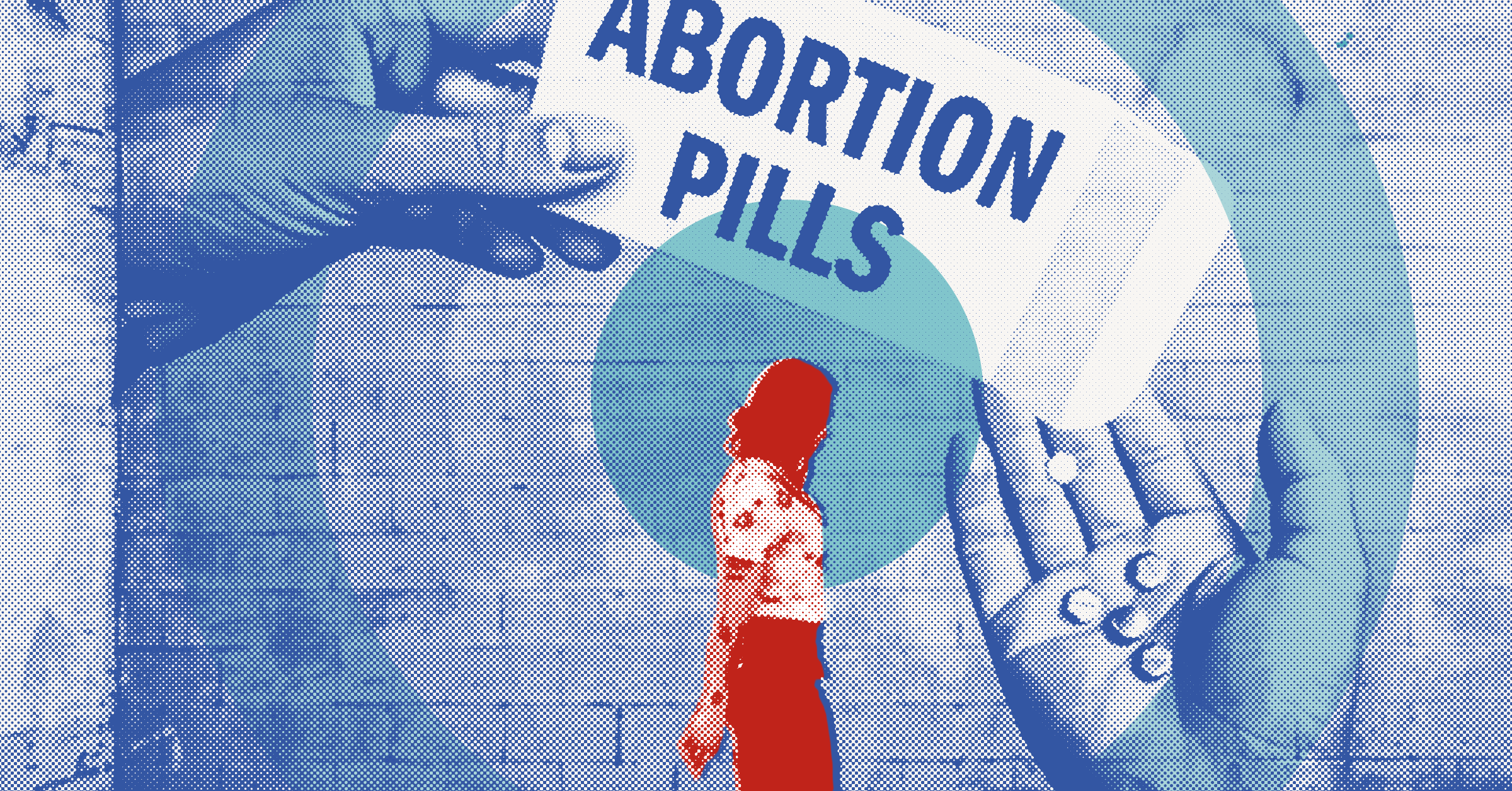There is some good news on the abortion front. The U.S. Food and Drug Administration has loosened its rules governing abortion pills. The FDA announced Thursday that it would no longer require the pills to be dispensed in person, meaning patients can receive pills in the mail after a phone consultation with a practitioner. The FDA limited this possibility to pregnancies of 10 weeks gestation or less.
It has taken decades of abortion rights organizing, medical studies, and lawsuits to get us to this point. Perhaps the most radical public action yet on abortion pills occurred in front of the Supreme Court on December 1, the day of the hearing about the Mississippi case. There, several Shout Your Abortion militants publicly took mifepristone to demonstrate its safety and spread the word about its availability. There’s a compelling video here. Across the country they dropped banners, painted murals, and even set up an Abortion Pill vending machine which dispensed information about how to get pills.
Actions like these, plus a pending ACLU lawsuit, reinforced the work medical researchers have been doing over the last decade to show that the FDA’s restrictions are unnecessary and harmful.
Pills in the Mail
The FDA had suspended its in-person requirements for abortion pills during the pandemic, but this announcement makes the change permanent. In dozens of states you can now talk to a provider on the phone and get pills overnighted to you. Abortion on Demand, set up after the pandemic rule change, provides this service for $239 in twenty states, including New York, California, Illinois and Georgia. Abortion costs $530 on average in the U.S. and is rarely covered by insurance.
The abortion pill combination of mifepristone and misoprostol is a safe, effective, and relatively inexpensive abortion method. Forty-two percent of abortions in the U.S. are now done with pills. But when the FDA approved mifepristone in 2000, it tacked on extra “Risk Evaluation and Mitigation Strategy” (REMS) regulations reserved for dangerous drugs.
Though the FDA has dispensed with the in-person dispensing part of the REMS, other red tape remains. The activist group Plan C Pills pointed out that the FDA kept a requirement that prescribers be specially certified and added that requirement for pharmacies. “Removing all of the restrictions would have made it easier for a wider group of clinicians to prescribe [the pills], including family physicians,” they noted.
Most feminists, and some physicians, want to see the pills much more widely available. For example, the FDA could make them an over-the-counter drug, some doctors argue. Lacking that, the abortion pill could be something you could have in advance, in your medicine cabinet just in case. And it could be something friends share in a pinch. Currently these options violate FDA rules.
Right-wing Reacts
The advent of widely available abortion pills threatens to wreck the right’s strategy of limiting abortions to clinics and then attacking clinics both legally and physically. In anticipation of the FDA’s change, right-wing state legislatures have been rushing to close the door on telemedicine options. Telemedicine abortion was already outlawed in 19 states, but Texas also just made it a felony to prescribe and mail abortion pills.
In those states that have made telemedicine abortion illegal, the Europe-based Aid Access provides the same service as Abortion on Demand, though it takes a little longer as the pills are shipped from a pharmacy in India, and supply chain problems have caused delays. The FDA has charged that Aid Access is violating U.S. law, but the group argues it is breaking no laws nor even FDA rules. Aid Access has been providing pills and counseling to patients in states with prohibitions on telemedicine for a requested donation of $110. (They ask for $150 in states where U.S. doctors associated with the service are allowed to provide telemedicine.)
Plan C Pills supplies an updated list, with a scorecard, of all available mail-order options, including grey-market internet sites. They also train Plan C “ambassadors of information” to spread the word about abortion pills and they distribute stickers and cartoons with information about how to get pills and how to take them.
Congress Could Protect Rights
Meanwhile, the Supreme Court has let Texas’s six-week abortion ban stand and is considering allowing states to further roll back abortion rights when they decide Dobbs v. Jackson Women’s Health Organization. That case concerns a Mississippi ban on abortion after 15 weeks, but the right-wing court majority seems determined to shred all abortion protections, judging from their comments in a December 1 hearing. A decision is expected next summer.
But the Supreme Court need not have the final say on abortion. Congress could pass a law protecting abortion rights throughout the country. The House already passed such a bill, the Women’s Health Protection Act, in September. Now it’s blocked up by the Senate filibuster rule, along with all other pieces of important legislation, from labor rights to climate protection.
While the Supreme Court may rule there is no right to abortion in the constitution, it’s harder for the justices to claim that Congress can’t protect abortion rights throughout the country. This is especially true since abortion was legal for the first 100 years of the existence of the United States, and we’ve just had fifty years where the court claimed the right to abortion is protected by the constitution.
These facts suggest a two-pronged strategy: The first is a full-on demand to end the filibuster rule and pass the important legislation backed up behind it, including abortion rights. Bernie Sanders suggested this after the Supreme Court heard Dobbs, writing, “We must pass legislation that codifies Roe v. Wade… And if there aren’t sixty votes to do it, and there are not, we must reform the filibuster to pass it with fifty votes.”
The second prong is a mutual aid and propaganda effort. While we continue to push the FDA for more abortion pill access, including over-the-counter access, we should occupy the space opened up by Thursday’s change. This requires an information blitz in both legal and illegal states, communicating that telemedicine abortion is available.
Already in Texas this is a life-and-death matter for those seeking abortions. And half the country will be in the same situation if the court overturns Roe v. Wade next summer and the Democrats are unable or unwilling to pass legislation defending abortion access across the country. Shout Your Abortion and Plan C Pills are places to start.




